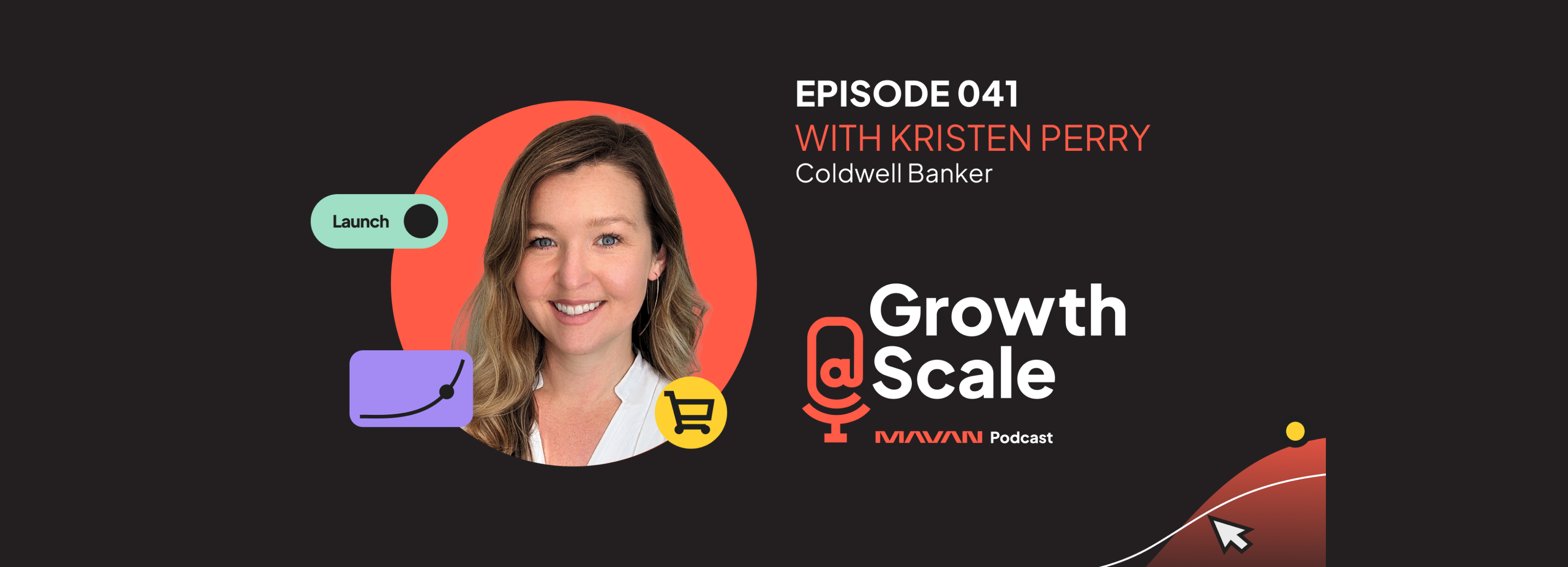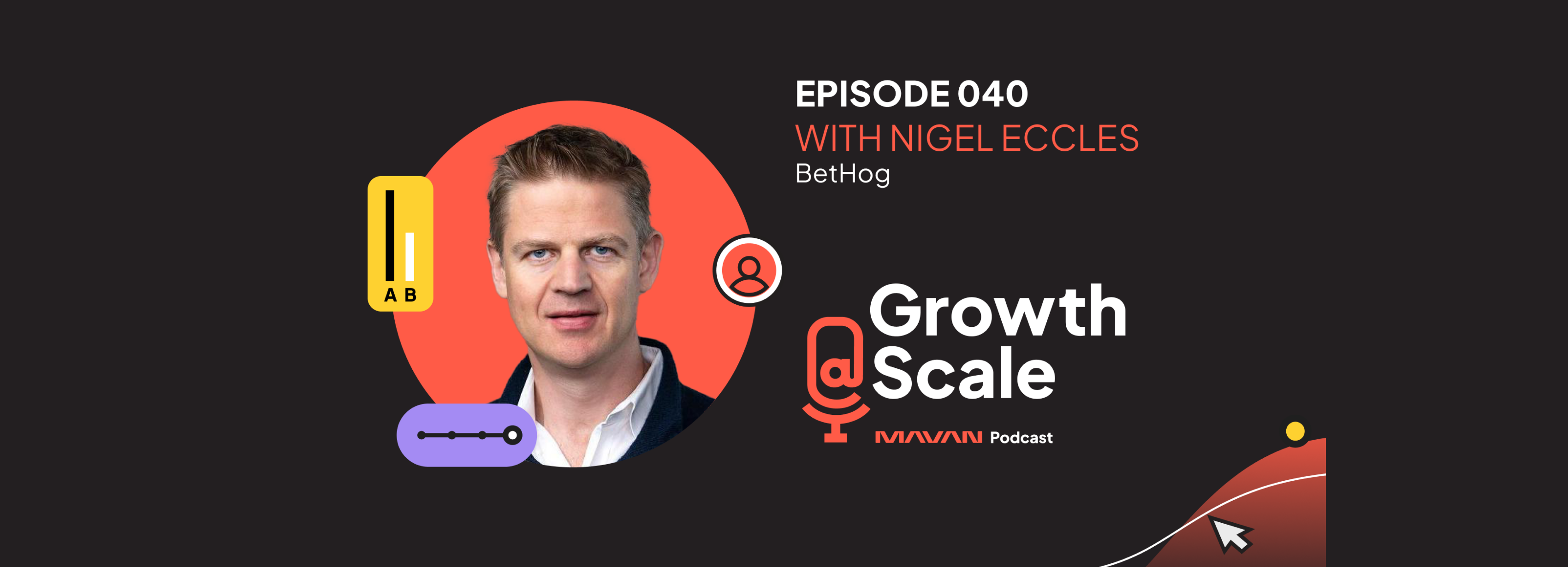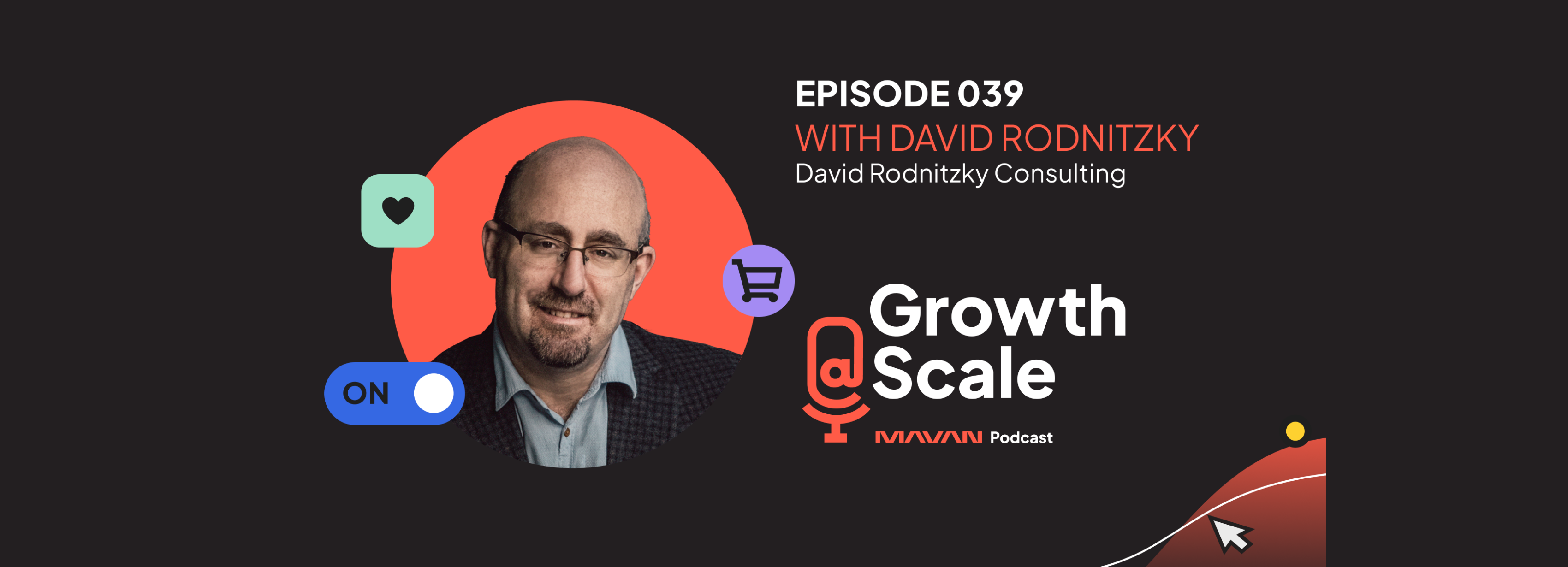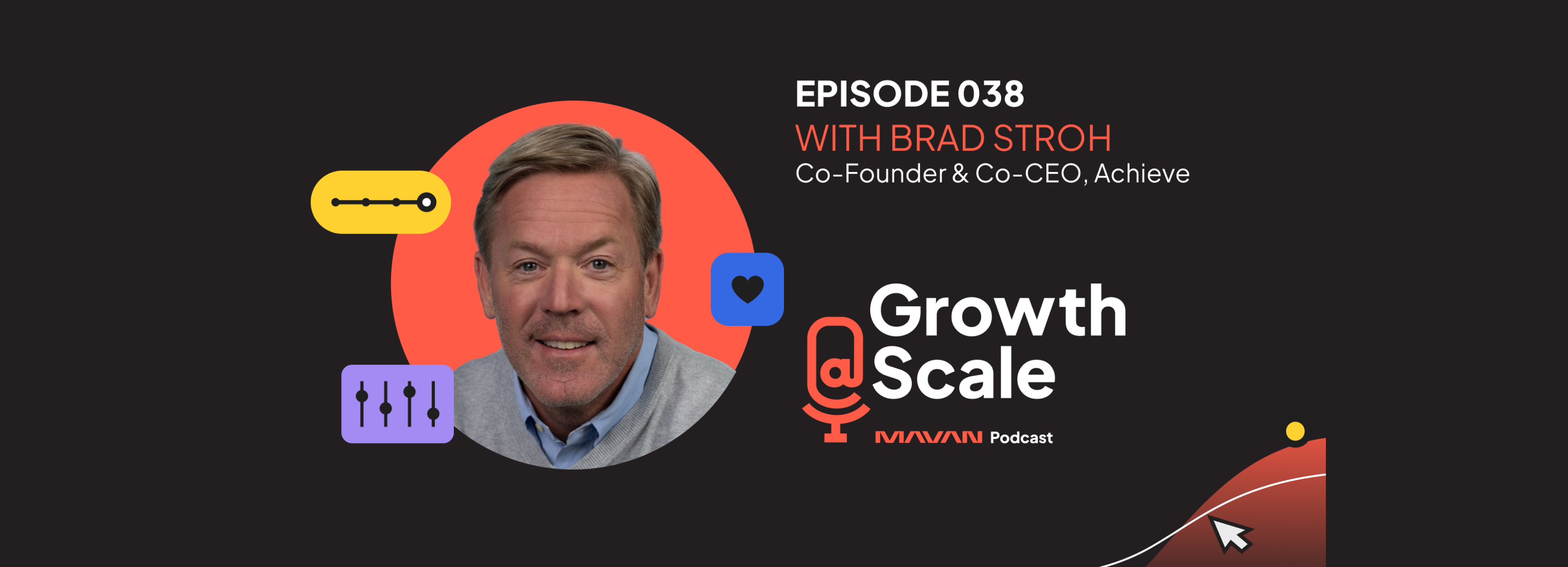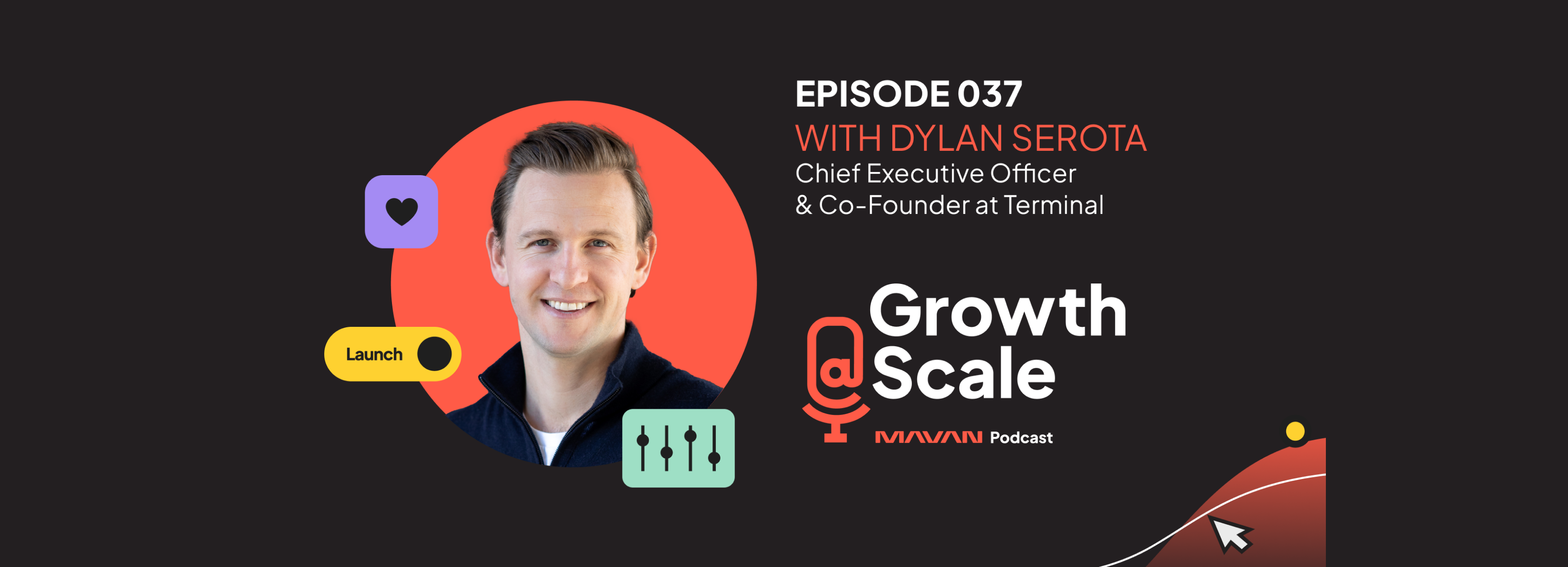Growth@Scale – Episode 1 – Aurelie Guerrieri
In our inaugural episode of Growth@Scale, MAVAN CEO and host Matt Widdoes sat down with Aurelie Guerrieri, CMO of DataDome and author of Mobile Natives Guide to Advertising.
In their conversation, they discuss strategies for building marketing teams, why a diversity of expertise is important for growth, and when a start-up should hire a CMO.
Give it a listen or read the transcript below.
Matt Widdoes
A common theme that we see as we're building companies and as we've gone into larger and smaller is there's always a new growth challenge. We focus a lot, maybe on the right person with the right skills at the right time for the right amount of time. There's a lot to unpack there, but typically the person that took you from A to B won't take you from B to C and so on. I'm curious to hear your opinion on the various types of marketers. What you see as kind of right, if you will, if there's such a thing at the right stage and how founders and leadership generally should be thinking about their next marketing hire.
Aurelie Guerrieri
The question I get asked all the time by VCs is what kind of marketers should we have on this team? That is best answered if you think about the goal of your marketer. HBS did a fantastic study a few years ago that was called, unfortunately, Why CMOs Never Last? One of their conclusions was that there's obviously no bad marketer. It is just badly fitted marketer, not the right time, not the right stage. They did this cross-sectional survey of the kind of marketers and they found that in about half of the cases marketers needed to primarily focus on building pipeline.
Here you're looking at heavy demand generation skills, very close collaboration with sales, really good digital marketing skills, etc. But in about a third of the cases, the marketer really needed to focus on the strategy and innovation. So this is where you're looking at partnerships, you're looking at product marketing, you're looking at category positioning, very, very different skill set. And in about a quarter of the cases, which I think is very similar to my experience and some of your experience, it's P&L ownership.
So these are marketers that are sitting on top of the lifeblood of the company, so they're not only doing the acquisition aspect, but also doing the monetization aspect and really connecting the dots. And for many mobile-firsts, for many digital-first companies, that whole P&L ownership sits fairly with the marketing team.
So if I'm describing those three roles, there's no one that can be perfect for each of these types of needs. And as the company evolves, also, you realize you need different talent as well.
MW
Maybe we could bucket these as like a company that has raised less than a million, a company that has raised less than 10 million, less than 20 million, less than 100 million or something like that. How do you think about that at the various phases of company's growth?
AG
Absolutely. And there's also two questions to answer here is the skill set and the level of expertise, because it's really hard to find that unicorn who is going to scale up with you. And I often tell founders, don't spend too much time trying to oversize or look for the perfect fit that can evolve with you, but really try and answer the problem that you have today, because as you scale up, it will create more opportunity for this person and for you to bring other people in as well.
So early, early stage, it's about bringing your product to market. So the kind of marketer you have is really a product marketing head, right? It's somebody that really understands how to position. And then as you scale up, you need to get the word out. And this is where you have your typical growth hacker program. So that's where you start, you know, product led growth, you start opening up some marketing channels. And this is a wear multiple hat typical startup scale up profile. There's not, you know, a universal background. These tend to be people who like tinkering, who are very data- driven, who are super creative, innovative, like putting their fingers in a lot of pies in the organizations. They're really good connectors. And as you start scaling up, then it starts to be important to start being more disciplined and starting building functional expertise.
So essentially you complete your team based on what you built up till now and the strengths that you have until now and figuring out, okay, now I need some brand marketing expertise. Now I need some channel and marketing expertise. Now I need some specific media expertise, some business. But it's also the tactical aspect of needing business operations, needing more tech, you know, and ATEC and other analytics. So that team scales up, complimenting what you have.
MW
So speaking of C-level executives and kinds of the challenges they face late in growth, are there any kind of common problems or solutions to those problems that you've seen?
AG
Yeah, I think that the big challenge as you're scaling up is that you're scaling your entire organization. So typically between series B, series C, this is where you hire a lot of people and you also hire functional experts to shore up those areas where you need more expertise. So what happens is that it creates this layer between the C levels and the rest of the organization and you have a lack of information flow top down and bottom up, which as a C-level, you know, it means you lose visibility and you also are not able to really keep a pulse on the culture of the company and how everybody is feeling.
And as an employee, it means that you're losing visibility into what is really going on in the organization and most middle management actually typically gets promoted to middle management without much training. And so you have this layer that is super inefficient in an organization. So it takes a lot of forfeit in structuring your information flow. And it's painful at the beginning because you used to be 20 in a room and being able to hear what the others were working on. And now you have to put formal processes in place and it feels like it's a lot of work. And it is a lot of work sometimes. And you need to understand, you know, how many times you have to repeat the information.
So, you know, the way I explain communication often is I say, look, you know, we know it takes between seven and 15 touches to reach a prospect and convince them. It's the same internally. You have to repeat the same message a lot of times using a lot of different channels. And so there's a very important work around information transparency and sharing there. And then the other aspect is defining those new boundaries. And I'm really proud to talk about DataDome where we built our first product marketing team. So of course, there was product marketing work that was done there before that team was built, but it was in a typical startup fashion. It was spread across multiple people. So as we create a team here, there is a bit of work understanding the boundaries, what does the team do? What does the team not do? How do they interact with our people?
So we did work at the beginning, just educating the organization and saying, "Hey, this is what the job is going to be. This is what the goals of the function are. This is where you can call the function to your interface with them." And that was super helpful for everyone in the organization to understand, okay, you know, now I know to go to them with this kind of problem. So I think understanding where you are bringing novelty, understanding where you are bringing change and continuing to bring the organization with you are super, super important as you scale up.
MW
That's funny. We see that all of the time where particularly early-stage companies would massively benefit from having a deep bench of deep expertise. You just don't have the resources to do that. So you end up oftentimes a couple of generalists and you get, you know, kind of what you see oftentimes at early stage companies. And we're oftentimes bringing in that depth of bench when we get back to that, you know, right person at the right time for the right amount of time. It's so valuable to bring in that expertise. But you do as these organizations grow, you uncovered this other piece in your last comment in that you can culturally be inside the organization and now be at a space where you've done really well, the team that you had, that early team, those first 20 people, have done an excellent job.
However, they maybe aren't the right person to be that senior leader later, but culturally you feel really weird hiring above them and you certainly risk losing them. And we've all seen that happen where you bring in another leader and they want to bring in their own team or the person who kind of was your initial marketing hire feels kind of slighted and they move on and they go take something that's better for them. That's maybe a click in between where you are now and where you were when they started with you. And so I'm curious, like as you think through that change, right? And we think through the types of marketing leaders that founders or CEOs or organizations generally should be hiring.
How do you think about that? And what are those differences when you think of that kind of first marketing hire, like literally first marketing hire, maybe there's 20 people at the company, maybe there's only three, followed by post that initial round of success where you've taken in maybe 10 and then you take in another 20. How do you think through some of those differences? We talked a little bit about it at the top, but how would you kind of differentiate those kind of maybe three or four different prototypes?
AG
Yeah, I think what you're talking about now is the team, right? What kind of team do you build? And I really, as you know, in favor of the fractional approach because often what I find is because companies have a limited budget, they pick and choose in something, sometimes it seems a little random, they pick and choose with functions get done and with functions don't get done.
So I'll give you an example. Once I was working with a $30 million ARR MarTech company, so we're talking about like B round, they had six marketers, two of them were video content producers. So don't get me wrong, I'm a big fan of video as I mentioned it, right? But putting 30% of your headcount on it seems really overkill. And this is typically a function where you could easily outsource and have somebody just bringing that specific skill set and keep your in-house resources in a much more flexible way. And I've seen that time and again. But as you're thinking about these hires, I think there's who you hire today and how can you evolve them? And I'm a little partial to the approach of who you hire today in an early stage is this, you know, person who has a really, really brilliant brain and can figure out a lot of problems very quickly and somewhat superficially, but very smartly. And they will know where to get the help and where to get that deep expertise that they need. And it will scale up that way.
The challenge that you have is that in order to empower this person, you're going to give them free reign. And as you're going to scale up to keep them interested, you have to figure out a job that is still very nimble, still very creative, still very involved, but at the same time, you know, fits in a neat way within a function, right? So as a manager, as a CMO for this, this is typically one of the roles where you have developed brilliant people, you know, the growth marketers, and you need to continue providing them really interesting career challenges, although the job might become the error and they might have, you know, alongside them, experts that take over some functions or they might have somebody like me that gets, you know, to manage them. And then when you bring those experts, I think one of the mistakes that I see scaling companies do is that they continue hiring for the same profiles. They continue hiring for the growth-minded person, for, you know, a smart brain, but not enough expertise.
Well, you don't really need to bring those talents when you are much bigger as a company, when you're B-round or C-round, this is where you need to bring in poeple who have done it before. They might have done less, they might have a narrow scope, but they need to have seen it at the later stage of what you are. If you're a $50 million company, you need to bring somebody who's done it at $200 million, so they can see how you get there. Because the smart minds are going to figure it out. Sure, but you're going to lose cycles doing it. At this point, what you're trying to do is you're trying to out-pace everyone else.
Getting that talent in, who can bring in the vision of what it looks like, and get you there faster is super, super valuable.
MW
Yeah, I feel like at the earliest stage, and this is rehashing some of what you said, but you need somebody who's super operational, but they're unlikely to be your team builder next. Now you need to bring in a team builder to bring in 10 people who can spin plates in a very small confined area, potentially a little bit more specialization. Then that person who's the great team builder in your next phase might not be the great strategic mind that you need with that deep experience that can chart that course and say, here's how we grow a business from $30 million to $300 million. You may actually need another person to take you from $300 million to $1 billion.
So I think it is very interesting how that shifts over time. And there is this dynamic that exists where, sadly, I think the lifecycle of the company can sometimes outpace the abilities of the leaders of yesterday. And that's another kind of common thing that we've seen. Companies with, again, all of the best intentions, keeping those people around too long and continuing to bump them into these leadership roles where they really outgrow, and then something happens and it all pops, and that's even worse than just charting that course from the beginning.
AG
Yeah, I've seen a lot of companies recently bring in CMOs way too early. Because particularly those companies that got a little overfunded a little early, there's a lot to show to the investors. And so immediately the knee-jerk reaction is, "Oh, let's hire a CMO." And often you end up hiring somebody that's way outsized and give them a title that they're not ready for. And that CMO that you're going to bring in just doesn't have the foundational size of the team, the foundational stage of the company in order to be effective. And so they end up either creating noise and work to keep themselves busy or failing. And the average tenure of a CMO is 18 months.
MW
Okay, great. Well, thank you so much again for the time today. Always a pleasure speaking with you, and I look forward to the next time.
AG
Thank you for having me, Matt.
MW
That was Aurelie Guerrieri. I hope you enjoyed it as much as I did, and that you've got some new ideas for encouraging growth within your organization. Thanks for listening to Growth at Scale. Check back soon for more chats about growth.
